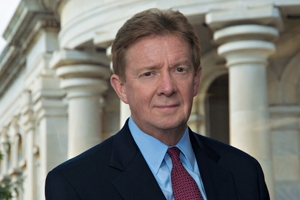On Campus
President Kerwin: Rule-Making Key to Shaping Public Policy

The most effective lobbyists shape public policy by writing the rules for laws passed by Congress, President Neil Kerwin said in a talk on “Rulemaking and Public Advocacy” at a recent workshop sponsored by the Public Affairs and Advocacy Institute at the School of Public Affairs.
“Rule-making processes are the most important sources of law in the United States,” said Kerwin, a nationally recognized specialist in public policy and the regulatory process. “Organized political interests consider efforts to influence rule-making to be as or more important than lobbying Congress, making political contributions and grassroots political work.”
Kerwin, who has been the president of American University since 2007 and is a former dean of the School of Public Affairs, founded the university’s Center for the Study of Rulemaking. He also is co-author of the definitive text, Rulemaking: How Government Agencies Write Law and Make Policy.
“Neil’s insights and expertise were invaluable to the students starting their lobbying careers,” said Jim Thurber, director of the Center for Congressional and Presidential Studies and organizer of the workshop.
Kerwin said Congress delegates a massive amount of authority to federal agencies, such as the Environmental Protection Agency or Federal Aviation Administration, to write rules that give a law its teeth. While Congress and the president provide the general framework for the government’s mission, rule-making fills in the details that define the law and delineates how each agency carries out its responsibilities.
“The vast majority of rules are issued by agencies with very little oversight by Congress,” said Kerwin. “Congress doesn’t have the time, expertise or political will to make the kinds of decisions that agencies make every day about who is going to work and be unemployed, what industries will thrive and fail, and who, frankly, lives and dies.”
Kerwin said that rule-making is so important that during the 11-day shutdown of the federal government last year, rules continued to be issued. He told students that, as lobbyists, they can’t just focus on legislation being passed by Congress.
“You will always be engaged in an activity on Capitol Hill that requires subsequent rule-making,” he said. “Your interactions with Congress probably should be focused on setting the stage for the real work that’s going to get done in the agency.”
Since federal agencies have a limited ability to collect and use information, public advocates have never been more important to the rule-making process. “If the government is to have the information it needs to make good law and policy, it is going to come through third parties,” he said. “It’s a symbiotic relationship. Your working relationship with agency personnel has to be as every bit as close and intimate as with staff on the Hill and members of Congress.”
Because of political gridlock in Congress, President Obama has turned to rule-making to advance an ambitious second-term agenda that includes action on climate change. While 78 pieces of legislation were passed by the most recent Congress, the average number of rules issued annually is between 2,500 and 4,500, according to a May 2013 Congressional Research Service report.
“The president, with the exception of the independent regulatory commissions, like the Federal Communications Commission and Securities and Exchange Commission, is Rule-Maker-in-Chief,” he said. “In the areas he chooses, he is a major player.”
Kerwin said that some scholars insist that rule-making is a violation of the U.S. constitution, which delegates to Congress sole responsibility for the legislative process under Article I, Section I. “It says the legislative process is vested in Congress, not Congress and the FAA, or Congress and the EPA or Pension Guaranty Benefit Corporation.”
But he called that strict interpretation of governmental power “wrong.” “Rule-making is necessary if you want to run a modern society and economy,” said Kerwin. “Bureaucrats and political appointees are not elected, yet they are the ones who make these decisions.”
He said that even if Congress was predisposed to making decisions about airline safety, for example, it wouldn’t have the capacity. The Federal Aviation Agency employs electrical, mechanical and structural engineers, as well as other technical experts, to ensure that commercial air travel is safe and efficient.
“Every element of that aircraft, even the people working on it, is regulated. They are, in effect, a product of a rule-making process,” he said. “Would you prefer that a 737 you’re about to board is the product of an FAA decision-making process or a subcommittee on Capitol Hill?”
Kerwin said that to discharge his duties as president, he reads the relevant sections of the Code of Federal Regulations written by career civil servants, rather than the U.S. Code written by Congress, to ensure that the university is in compliance with applicable law.
“I’ve read the U.S. Code because I’m interested in it as a scholar, but in terms of getting my job done and keeping the university in compliance, the Code of Federal Regulations is where all the action is.”